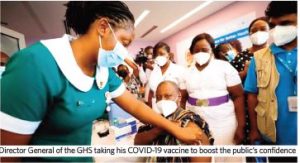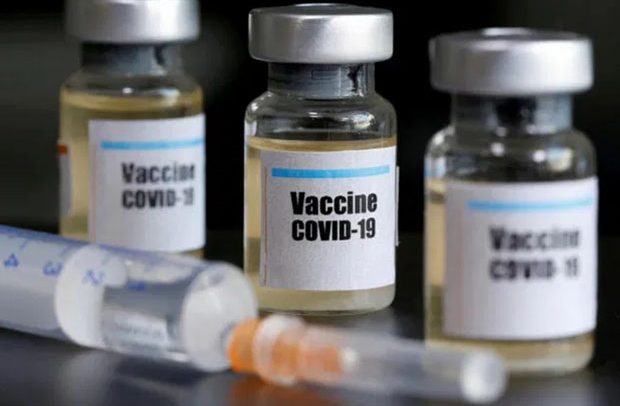On March 2, 2021, Ghana kicked off its COVID-19 vaccination campaign with 600,000 doses of the AstraZeneca vaccine received from the United Nations (UN) partnered COVAX initiative.
The roll-out of the vaccination exercise, which started with high risk groups including health workers, adults 60 years and over, and persons with underlying health conditions, soon extended to the public as the country took delivery of thousands of donated vaccine doses from its development partners.
In all, a total of 12,471 vaccinators, 37,413 volunteers and 2,079 team supervisors were deployed across the country, after receiving training, for the planned vaccination campaign which targeted 20 million people.
“The only way out of this crisis was to ensure that the COVID-19 vaccine is available for all,” said Dr. Patrick Kuma-Aboagye, Director General of the Ghana Health Service (GHS).

As the exercise progressed, data from the field painted a picture which showed disparities in vaccine uptake.
While the cities were recording increasing vaccine coverage, a few months after the nationwide roll-out, some districts were struggling to reach their targets.
As at February 28, the GHS has vaccinated 4,867,214 out of the targeted 20 million. Some 8,793,591 people have received their first dose while 127,214 have received a booster dose.
This number represents 44 per cent of the targeted 20 million people to be vaccinated.
Experts have pointed out various reasons for vaccine hesitancy citing widespread misinformation and myths.
“Initially, myths were largely on causes and vulnerability. These misconceptions served as risk attenuators among Ghanaians, especially the younger generation… interview segments also revealed the use of myths to propagate political agenda in the country,” said researchers Philip Teg-Nefaah Tabong of the University of Ghana and Martin Segtub of the University of Professional Studies in their study, ‘Misconceptions, Misinformation and Politics of COVID-19 on Social Media: A Multi-Level Analysis in Ghana’.

Playing Politics
The political system in Ghana is riddled with high patronage, resulting in extreme competition for political capital. With the government leading the response, there is an ongoing competition for political advantage toward the forthcoming elections in December 2024.
As the pandemic evolved, the opposition National Democratic Congress (NDC) put together a technical team. This, in the opinion of others, resulted in the dissemination of conflicting positions about COVID-19 in social media.
For instance, the opposition NDC was the first to raise concerns about the incumbent’s management of information and communication relating to COVID-19. They also claimed the government was using it as an opportunity to gain some form of sympathy votes for the coming election.
“There is generally mistrust between the incumbent and the opposition which is fueling the misconception about the condition.
The opposition constituted a parallel COVID-19 support team… providing different information. So the ordinary Ghanaian becomes confused and relies on the ‘infodemic’ on social media which largely are misinformation,” Tabong and Segtub said.
Senior Lecturer and acting Dean of International Programmes at the University of Health and Allied Sciences, Dr. Robert Kaba Alhassan, said although there is no proven science as to whether the COVID-19 vaccine can make one vote for a particular political party, it should not be rubbished completely because what people hold as a belief is difficult to change.
The Upper Manya Krobo District in the Eastern Region is a stronghold of the opposition National Democratic Congress (NDC) and is made up of farming communities and a fairly literate population.
The district, in the region with the third highest COVID-19 infections, experienced a low turnout for the vaccination exercise in the initial drive due to misinformation and unsubstantiated rumours.
The health directorate estimated to vaccinate about 50,104 people in the district by the end of 2021, but had only 282 people fully vaccinated as at December 2021. Also, about 820 people who took the first dose were hesitant to take the second.
“Some are saying the government has put in certain things so that it will change their minds from voting for any other party except the sitting party,” Esther Dua Oyinka, District Health Director said while lamenting the low vaccination turn-out in the district, a few months ago and expressed the fear that thousands of vaccine doses could go waste.
President’s Declaration
The turning point came in December when President Nana Addo Dankwa Akufo-Addo debunked the rumours in his COVID-19 address.
“This is an outrageous claim,” President Akufo-Addo said. “Vaccination cannot change your political preferences. That is not its purpose,” he added.
Sensitisation
Dr. Alhassan said there is the need for more public education which he believes should come directly from the GHS.
The development youth group in Krobo believes the issue is not entirely political but also poor sensitisation.
A member of the Krobo youth group, Simon Nuertey, who is fully vaccinated said vaccine hesitancy is a result of low sensitisation by health officers. “They need to enhance the education because people are having divergent views about the vaccines,” he said.
Twenty-five-year-old Abigail Tey, who is yet to take her vaccine, said she will need more encouragement from the health authorities.
“A lot of people are still unaware of it so health authorities have to educate people especially, those in the rural areas to know more about it,” she pleaded.
This report was supported by the International Women’s Media Foundation’s Global Health Reporting Initiative: Vaccines and Immunisation in Africa.
By Jamila Akweley Okertchiri

